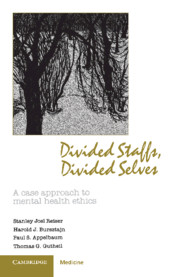Book contents
- Frontmatter
- Contents
- Acknowledgments
- About the authors
- 1 Introduction
- 2 New problems, new ethics: challenging the value structure of health care
- 3 Conflict and synthesis: the comparative anatomy of ethical and clinical decision making
- 4 Solving clinical puzzles: strategies for organizing mental health ethics rounds
- CASES IN MENTAL HEALTH ETHICS
- I Informed consent, competency, and involuntary treatment
- II Confidentiality
- III Truth-telling
- IV Managing difficult patients
- V Parents and children
- VI Religion and mental health treatment
- VII Allocation of resources
- VIII Research
- IX Mental health and medical illness
- X Mental health and criminal justice
- Bibliography
- Index
III - Truth-telling
from CASES IN MENTAL HEALTH ETHICS
Published online by Cambridge University Press: 06 July 2010
- Frontmatter
- Contents
- Acknowledgments
- About the authors
- 1 Introduction
- 2 New problems, new ethics: challenging the value structure of health care
- 3 Conflict and synthesis: the comparative anatomy of ethical and clinical decision making
- 4 Solving clinical puzzles: strategies for organizing mental health ethics rounds
- CASES IN MENTAL HEALTH ETHICS
- I Informed consent, competency, and involuntary treatment
- II Confidentiality
- III Truth-telling
- IV Managing difficult patients
- V Parents and children
- VI Religion and mental health treatment
- VII Allocation of resources
- VIII Research
- IX Mental health and medical illness
- X Mental health and criminal justice
- Bibliography
- Index
Summary
ARE THERAPISTS THEIR BROTHERS' KEEPERS?
What to do when suspecting collegial malpractice.
The patient is a 39-year-old male with a diagnosis of chronic schizophrenia. His condition is followed in a Schizophrenia Clinic, where he comes every two weeks for an injection of medication. He has a low IQ, severe character problems, and occasionally develops paranoia, which is well controlled with medication. He sometimes engages in voyeuristic behavior, which diminishes when the dose of medication is increased.
While under this psychiatric treatment, the patient suffered a gall bladder attack and had his gall bladder removed. Two months after the operation, he called on the psychiatrist complaining of increasing pain and difficulties in moving his left hand. He was referred to an internist who found stiffness in his left arm and loss of sensation and muscular atrophy of the fourth and fifth fingers. He was treated with drugs for possible nerve damage for several months, but without improvement.
At this point, the psychiatrist began to question him about when he had first noticed the problem. The patient replied that it had begun about 2 or 3 days after discharge from the hospital. He said that the problem did not interfere with his life, because he was still able to perform basic housekeeping chores and go shopping for his mother, but that he would like to know what is going on. Since the psychiatrist was affiliated with the hospital where the operation took place, a review of the hospital chart by him, including the operative report, was possible without the patient's knowledge.
- Type
- Chapter
- Information
- Divided Staffs, Divided SelvesA Case Approach to Mental Health Ethics, pp. 79 - 86Publisher: Cambridge University PressPrint publication year: 1987
- 1
- Cited by



